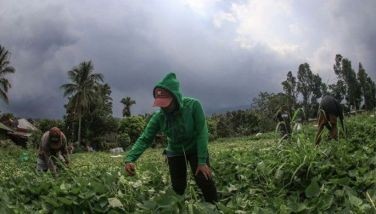DOH to conduct own probe on vaccine mess
MANILA, Philippines - The Department of Health (DOH) is conducting its own probe into the alleged questionable purchase of P833 million worth of vaccines in 2012 that prompted Secretary Enrique Ona to go on leave.
Acting Health Secretary Janette Garin said before going on medical leave last October, Ona had ordered the creation of a committee to look deeper into the purchase of the pneumococcal vaccine.
Ona, in a statement read by DOH spokesman Lyndon Lee Suy, gave assurance that the DOH and the committee will exert all efforts to uncover the truth behind the alleged irregularity.
“Our review committee will leave no stone unturned,” Ona said as he stressed that the DOH always strictly adhered to “transparency, integrity, and honesty” in all its transactions.
Lee Suy said the four-member special committee is composed of former and current health officials with no links or association with the current DOH administration.
He said the committee is expected to submit its findings to Ona to be included in a report he will submit to President Aquino by the end of the month.
Malacañang said yesterday Ona’s fate would depend on his answers to the questions raised by President Aquino.
Deputy presidential spokesperson Abigail Valte said Ona deserves to be given “a chance to a fair shake” while preparing to answer the issues surrounding the procurement of multi-million pesos worth of vaccines in 2012.
“It would depend on his answers to the questions propounded by the President. The President himself mentioned he had questions on a particular issue on the vaccines,” Valte said when asked about the chances that Ona would keep his job.
“He has asked for a month to gather answers to the questions that have been propounded to him so let’s give him a fair shake during the month that he asked for,” she added.
Last month, officials said Ona went on a month-long leave while recovering from an allergic reaction to hair dye. The President later revealed Ona took a leave of absence to allow him to answer the questions surrounding the purchase of the vaccines.
Not a sign of doubt
Valte stressed Ona has the right to be presumed innocent until proven guilty.
“The presumption applies to everyone, every Filipino. It is provided by the 1987 Constitution. That is not a policy of the President,” she said.
Valte said the President’s directive to have the purchase investigated “is not a sign of doubt” about Ona’s integrity.
“This is not the first time that the President has asked for an investigation, not specifically on the person but on a particular incident,” Valte said.
Ona said the DOH procured the pneumococcal conjugate vaccine (PCV) in 2012 amounting to P833.6 million as part of its Expanded Vaccination Program aimed at protecting 333,000 children against pneumonia.
“In 2012, the unit cost for PCV 10 was $ 15.40, while that of PCV-13 was US$16.34, or a cost difference of almost $1.00,” Ona said.
“It is in the appreciation of the ‘cost effectiveness’ of these two competing vaccines for Filipino children that usual medical discussion and differences are being presumed to have been tinged with ‘graft.’ This is what the committee is investigating closely,” Ona said.
Lee Suy said the PCV 10 was delivered in 2012 and has been used in the DOH’s ongoing immunization program since January 2014.
He said the DOH would fully cooperate and coordinate with the National Bureau of Investigation (NBI) upon orders of President Aquino.
Aside from Ona, Justice Secretary Leila de Lima named Health Assistant Secretary Eric Tayag as among those being investigated in connection with the multimillion-peso irregularity.
De Lima said the complaints against Ona and Tayag stemmed from their approval of the purchase of PCV 10 despite recommendations from the National Center for Pharmaceutical Access and Management, Formulary Executive Council and the World Health Organization (WHO) that PCV 13 was more suitable and cost-effective.
“Cost effective in the sense that PCV 13 covers more diseases unlike PCV 10, which has limited coverage,” De Lima explained.
Tayag is still reporting for work but refused to be interviewed by reporters.
Lee Suy said DOH officials and employees are unaffected by the reported anomaly and are rallying behind Ona and Tayag.
He said the DOH will continue implementing their programs, including the expanded vaccination program.
Vaccine safe
Both Garin and Lee Suy said that they will no longer talk about the issue so they could focus on their programs and avoid sowing fear among the people over the efficacy of the vaccine.
“There is no issue about the safety and efficacy of the vaccine, so we will continue with the immunization program,” Lee Suy said, adding that PCV10 can be used both for adults and young children.
A vaccine expert from the University of the Philippines-Manila also supported the purchase of the PCV 10 vaccine.
Lulu Bravo, convenor of the Vaccine Study Group at UP-Manila’s National Institute of Health, belied the statements of De Lima that the anti-pneumonia vaccine procured by the DOH was not cost-effective.
She said PCV 10 acquired by the DOH is comparable with PCV 13 in terms of safety and efficacy, besides being cheaper.
“It is not true that PCV 13 is more cost-effective. PCV 13 has extra serotypes – 6A, 19A and 3 – but they are insignificant. These extra serotypes made the vaccine more expensive,” Bravo said.
She said serotype 3 has been proven “not effective” while serotypes 6A and 19A have only “partial protection” to the two other serotypes.
“There is no scientific proof that one vaccine is advantageous over the other in Philippine setting,” Bravo said.
There are 90 serotypes of Streptococcus pneumonia, the leading cause of pneumonia in children, but the ones included in the vaccines are those that usually cause the most deaths.
Bravo added there are published studies about the cost effectiveness of PCV 10 while that of PCV 13 is more of “hearsay.” – With Alexis Romero, Sheila Crisostomo
- Latest
- Trending

































